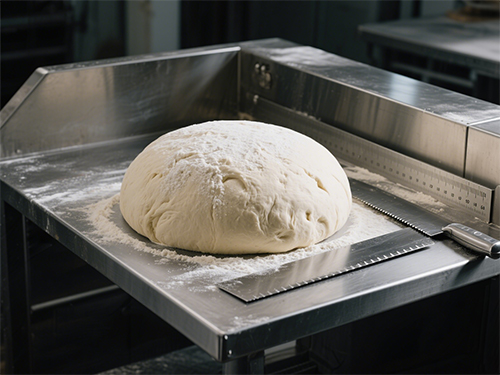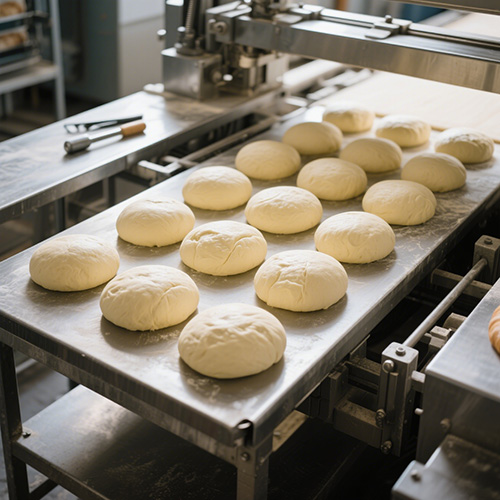


How can a bakery produce thousands of breads and pastries every day and ensure that each product meets the same quality standards? The answer lies in the dough mixers – the central component of modern industrial baking. The ability of the dough mixers to knead dough quickly, precisely and consistently is the key to mass production.
As a leader in intelligent bakery lines, Chengwo understands the importance of dough mixers solutions. With a dedicated research and development center, Chengwo is committed to developing advanced food processing equipment to meet the needs of today’s industry. This blog will look at how mixers can improve efficiency, quality and scalability across the bakery plant.

Dough mixers are specialized machines designed to combine flour, water, yeast, and other ingredients into a uniform dough. In large-scale production, these machines are engineered to handle high volumes, ensuring consistency across batches. Unlike manual mixing, which is time-consuming and prone to variability, industrial dough mixer deliver precise results, making them indispensable for bakeries aiming to meet high demand.
In a high-output bakery, time is money, and quality is non-negotiable. Dough mixer streamline the mixing process, reducing labor costs and minimizing human error. By automating the blending of ingredients, these machines ensure that every batch of dough has the same texture, hydration, and ingredient distribution. This consistency is crucial for producing uniform products, whether it’s artisan bread, soft rolls, or delicate pastries. Additionally, modern dough mixers are designed to handle diverse dough types, from dense sourdough to airy brioche, making them versatile tools for large-scale operations.
The technology behind dough mixer has evolved significantly. Early mixers were simple mechanical devices, but today’s models incorporate advanced features like programmable controls, variable speeds, and temperature regulation. These innovations allow bakeries to fine-tune the mixing process, optimizing dough development for specific recipes. At Chengwo, our R&D team continuously pushes the boundaries of dough mixer technology, integrating smart features to enhance efficiency and adaptability in large-scale baking environments.
Industrial dough mixer are built to handle large quantities of ingredients, often processing hundreds of kilograms of dough per cycle. This capacity is essential for bakeries producing thousands of units daily, ensuring that production keeps pace with demand.
Modern dough mixers offer precise control over mixing parameters, such as speed, time, and temperature. This allows bakers to achieve the desired dough consistency, whether they need a well-developed gluten structure for bread or a gentle mix for delicate pastries.
In large-scale production, equipment must withstand continuous use. Industrial dough mixer are constructed with robust materials like stainless steel, ensuring longevity and resistance to wear. Their reliability minimizes downtime, keeping production lines running smoothly.
Energy-efficient dough mixer reduce operational costs, a critical factor for large-scale bakeries. Advanced models incorporate motors and designs that optimize power consumption without compromising performance.
Dough mixers significantly reduce the time required to prepare large batches of dough. Automated mixing eliminates the need for manual labor, allowing staff to focus on other tasks, such as shaping or baking. This streamlined workflow boosts overall productivity.
Consistency is a hallmark of successful large-scale baking. Dough mixer ensure that every batch meets the same standards, eliminating variations that could affect product quality. This is particularly important for brands that rely on uniformity to maintain customer loyalty.
As bakeries expand, dough mixers provide the scalability needed to meet increasing demand. High-capacity models can handle larger batches, while modular designs allow for easy integration into existing production lines. This flexibility makes dough mixer a cornerstone of growth for industrial bakeries.
The following table outlines typical specifications for dough mixer, highlighting their capabilities in a large-scale production environment:
| Model | Capacity | Dimension | Voltage | Power | Speed (r/min) |
|---|---|---|---|---|---|
| LJ-25 | 25kg/80L | 960 × 650 × 1250 mm | 3-phase, 380V | 5KW | 120/240 |
| LJ-50 | 50kg/130L | 1140 × 720 × 1460 mm | 3-phase, 380V | 7KW | 120/240 |
| LJ-75 | 75kg/200L | 1400 × 750 × 1600 mm | 3-phase, 380V | 10KW | 130/260 |
| LJ-100 | 100kg/260L | 1500 × 900 × 1620 mm | 3-phase, 380V | 11KW | 130/260 |
| LJ-125 | 125kg/320L | 1520 × 940 × 1600 mm | 3-phase, 380V | 13.5KW | 130/260 |
| LJ-150 | 150kg/380L | 1640 × 1080 × 1550 mm | 3-phase, 380V | 15.5KW | 130/260 |
This table provides a snapshot of the features that make dough mixer essential for large-scale baking. These specifications ensure that bakeries can achieve high output while maintaining quality and efficiency.
Large-scale dough mixing can present challenges, such as overmixing, which can damage gluten structure, or inconsistent hydration due to improper ingredient ratios. Additionally, high-capacity mixers require regular maintenance to prevent breakdowns, which can disrupt production.
Advanced dough mixers address these challenges with features like automated ingredient dosing, which ensures precise ratios, and real-time monitoring to prevent overmixing. Regular maintenance schedules and robust designs also minimize downtime. At Chengwo, our dough mixers are equipped with smart diagnostics to alert operators to potential issues, ensuring uninterrupted production.
Different products require different dough consistencies. For example, pizza dough needs a strong gluten network, while croissant dough requires gentle handling to preserve layers. Modern dough mixer offer customizable settings to accommodate these variations, making them versatile tools for diverse product lines.
In large-scale production, maintaining product uniformity is critical. Dough mixers ensure that ingredients are evenly distributed, preventing issues like uneven rising or inconsistent texture. This uniformity translates to consistent baking results, enhancing customer satisfaction.
Hygiene is a top priority in food production. Industrial dough mixers are designed with smooth, easy-to-clean surfaces and comply with food safety regulations. Features like removable bowls and automated cleaning cycles reduce the risk of contamination, ensuring compliance with industry standards.
By optimizing the mixing process, dough mixer minimize waste from overmixing or improper ingredient incorporation. This not only improves efficiency but also reduces costs, making them a sustainable choice for large-scale bakeries.
The future of dough mixer lies in automation. Smart mixers with IoT connectivity can integrate with production management systems, providing real-time data on performance and maintenance needs. This allows bakeries to optimize operations and reduce costs.
As sustainability becomes a priority, dough mixer manufacturers are focusing on eco-friendly designs. Energy-efficient motors, recyclable materials, and reduced water usage in cleaning systems are becoming standard features in next-generation models.
With the rise of artisanal and specialty baked goods, dough mixer are being designed to handle niche recipes, such as gluten-free or high-hydration doughs. This flexibility allows bakeries to cater to diverse consumer preferences without sacrificing efficiency.
Dough mixers are key to large-scale baking, improving efficiency, consistency and quality in high-volume production environments. From streamlining workflow to ensuring product consistency, these machines are vital for bakeries striving to achieve scale while maintaining high standards. As technology continues to evolve, dough mixers are becoming smarter, more sustainable and more versatile to meet the demands of modern baking.
At Chengwo, we’re proud to lead the industry with innovative dough mixing solutions that provide bakeries with state-of-the-art equipment. Ready to upgrade your production line? Contact Chengwo to learn more about our advanced dough mixers and customized bakery solutions.
What is the role of dough mixers in large-scale baking?
Dough mixer automate the mixing process, ensuring consistency, efficiency, and scalability in high-volume production environments.
How do dough mixers improve product quality?
They provide uniform ingredient distribution and precise control over mixing parameters, resulting in consistent dough quality and better final products.
Are dough mixers energy-efficient?
Modern models are designed with energy-efficient motors and optimized designs to reduce power consumption while maintaining performance.
Can dough mixers handle different dough types?
Yes, advanced dough mixer offer variable speeds and programmable settings to accommodate various dough types, from dense bread to delicate pastries.
How often do dough mixer require maintenance?
Regular maintenance schedules depend on usage, but most industrial models are designed for durability and include diagnostics to alert operators to potential issues.

